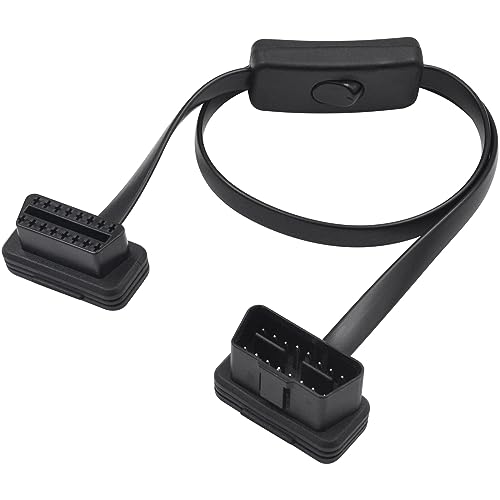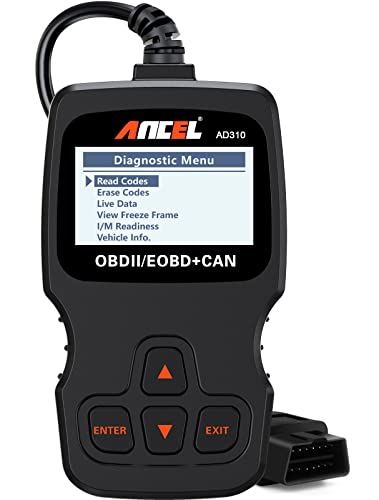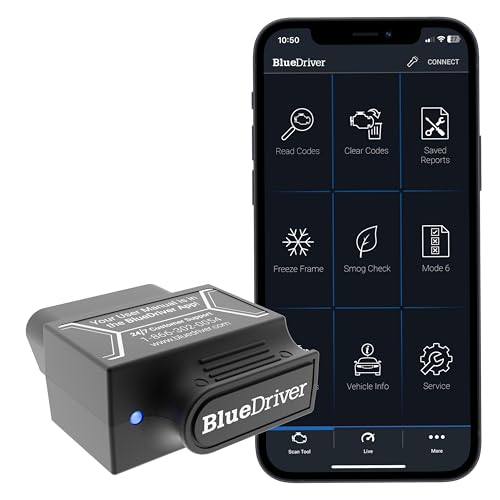As someone who spends a fair amount of time under the hood or tinkering with vehicle electronics, I can certainly empathize with the frustration of dealing with a hard-to-reach OBD2 port. Whether you’re running diagnostic scans, using a real-time monitor, or relying on a GPS tracker, a poorly placed port can be a real headache. I’ve often found myself wishing for a simple, elegant solution to access these vital connections without bending awkwardly or risking damage to the port itself. Without a proper extension, cables get tangled, connections can be unreliable, and persistent battery drain from constantly connected devices becomes a real concern. This is precisely where a product like the Duttek Right Angle OBD2 Extension Cable would have made a world of difference in my early days.
- This is an ultra-thin 16-pin OBD2 extension cable with 8 cores and sensitive and stable contacts. The total length is 60cm.
- It supports all standard OBD2 protocols and is suitable for hard-to-reach spots. By using the on/off switch, you can always insert it into a safe space to prevent battery damage.
Essential Considerations Before Acquiring an OBD2 Extension Cord
Before diving into a specific product, it’s crucial to understand why an OBD2 extension cord is a valuable tool and what factors should guide your purchase. These cables fundamentally solve the problem of inaccessible or awkwardly positioned OBD2 diagnostic ports, which are common in many vehicles. For anyone regularly interacting with their car’s computer – be it a professional mechanic, a dedicated DIY enthusiast, or even someone who uses an OBD-based GPS tracker or data logger – an extension cord provides much-needed flexibility and convenience. It prevents wear and tear on the vehicle’s original port, allows for easier mounting of devices, and can even facilitate cleaner cable management within the cabin.
The ideal customer for an OBD2 extension cable is someone who frequently connects and disconnects diagnostic tools, wants to permanently install an OBD-powered device without obstructing the footwell, or simply needs to move their scan tool to a more comfortable viewing position. This includes individuals who monitor vehicle performance, clear engine codes, or track their fleet. On the other hand, if you rarely use your OBD2 port – perhaps only for an annual emissions test – then an extension cable might be an unnecessary accessory. Basic users might not require the added length or features, and a simple, direct connection might suffice. Those looking for a diagnostic scanner itself, rather than an adapter or extension, should also note that this product serves a different purpose; it extends the port, it doesn’t read codes.
When making your choice, key aspects to ponder include the cable’s length (is 60cm enough for your needs?), its flexibility and design (flat cables are often preferred for routing), the inclusion of a power switch (essential for preventing battery drain from always-on devices), and its overall durability. Compatibility with all standard OBD2 protocols and the physical quality of the connectors are also paramount to ensure reliable performance.
- CEL Doctor: The ANCEL AD310 is one of the best-selling OBD II scanners on the market and is recommended by Scotty Kilmer, a YouTuber and auto mechanic. It can easily determine the cause of the check...
- Multi-Functions - Practical Multi-Functions OBD2 code reader features built-in OBD2 DTC lookup library, which help you to determine the cause of the engine light, read code, erase code, view freeze...
- [Pro OBD2 Scanner] - BlueDriver is the easiest way to scan and understand your vehicle like a professional mechanic. Read and clear your car’s trouble codes and check engine light.
Unveiling the Duttek Right Angle OBD2 Extension Cable
The Duttek Right Angle OBD2 Extension Cable is an ingenious solution designed to address the common frustrations associated with vehicle diagnostics. At its core, this is an ultra-thin, 16-pin male-to-female OBD2 extension cord, thoughtfully engineered with a right-angle connector and an integrated power switch. Its primary promise is to offer effortless access to your vehicle’s diagnostic port, safeguard your battery from constant device drain, and ensure durable, reliable connectivity, even in challenging environments. When you purchase this Duttek offering, you receive a 60cm (2ft) flat cable, equipped with 8 core wires and sensitive, stable contacts, ready for immediate plug-and-play installation.
Compared to more generic or older market offerings, the Duttek cable stands out with its ultra-slim profile, flat design, and, most notably, the built-in power switch. Many standard OBD2 extensions are bulky, lack a power toggle, or use round cables that are difficult to route discreetly. While some might consider 16-core cables superior, this 8-core design is perfectly sufficient for all standard OBD2 protocols, covering the vast majority of consumer and light commercial diagnostic needs.
This specific Duttek extension cable is ideally suited for anyone who regularly uses OBD2 devices such as scan tools, code readers, GPS trackers, or performance monitors and finds their vehicle’s diagnostic port to be in an awkward or high-traffic location. It’s a perfect fit for fleet managers, technicians, or even casual drivers who want to keep an eye on their car’s health without cumbersome wires or constant battery concerns. It’s less suited for individuals who expect a full diagnostic scanner, as it is purely an extension adapter.
Here’s a quick rundown of its advantages and a couple of minor drawbacks:
Pros:
* Integrated Power Switch: Prevents battery drain from always-on devices.
* Ultra-Slim & Flat Design: Allows for discreet and flexible routing in tight spaces.
* Right-Angle Connector: Ideal for hard-to-reach or recessed OBD2 ports.
* Durable Construction: Resistant to common workshop fluids, ensuring longevity.
* Wide Compatibility: Supports all standard OBD2 protocols and many popular devices.
Cons:
* Fixed Length: The 60cm length might be too short for some specific applications requiring longer runs.
* 8-Core Wiring: While sufficient for most needs, some highly specialized or advanced diagnostic tools might theoretically benefit from a full 16-core setup (though rare for standard OBD2).
* Not a Diagnostic Tool: It’s an adapter, not a scanner, which could be misunderstood by new users.
Exploring the Utility: Key Features and Their Advantages
Having used the Duttek Right Angle OBD2 Extension Cable for an extended period, I can confidently attest to the thoughtful design and practical benefits it brings to the table. Each feature addresses a common pain point experienced by anyone working with their vehicle’s OBD2 port, making it an indispensable tool in my setup.
The Ingenious Ultra-Slim, Right-Angle Design and Flat Cord
One of the most immediate and significant advantages of this Duttek cable is its ultra-slim profile combined with a right-angle connector and flat cord design. In many vehicles, the OBD2 port is tucked away under the dashboard, often near the footwell, making it incredibly difficult to connect a standard, bulky diagnostic tool or a straight-connector cable without it protruding awkwardly or interfering with driving. The right-angle male connector solves this instantly by allowing the cable to bend immediately, providing clearance in tight spaces. This simple yet effective design means I can plug in my scanner or tracker without it becoming an obstruction, snagging on my feet, or putting undue stress on the vehicle’s original port.
The flat cord, unlike traditional round cables, is a game-changer for cable management. It can be easily routed along edges, tucked under panels, or run through narrow gaps, creating a much tidier and safer installation. This isn’t just about aesthetics; a securely routed cable is less likely to get caught, pinched, or damaged, which in turn protects both the cable itself and the connected device. For me, this feature has allowed for a much cleaner installation of my permanent OBD2-powered devices, keeping the cabin free from unsightly and potentially hazardous loose wiring. It feels robust enough to withstand being stepped on occasionally without damage, which is a big plus in a work vehicle.
The Indispensable Integrated Power Switch
The inclusion of an on/off power switch on the Duttek Right Angle OBD2 Extension Cable is, without a doubt, its standout feature. Many modern vehicles continue to supply power to the OBD2 port even when the ignition is off, leading to a constant draw on the car battery if a device like a GPS tracker or certain code readers are left plugged in. I’ve personally experienced the frustration of coming back to a dead battery after leaving a device connected overnight.
With this integrated power switch, that worry is completely eliminated. I can simply flick the switch to “off” when the vehicle is parked for an extended period or when I don’t need the connected device to be active. This not only prevents battery drain but also prolongs the life of the connected diagnostic tools by preventing them from being constantly powered on. For those who permanently mount devices, such as a telematics unit in a fleet vehicle or a dash cam that draws power from the OBD2 port, this switch is an absolute godsend. It provides peace of mind, knowing that I have control over the power supply without having to constantly plug and unplug the device, which itself can lead to wear on the connectors. It’s a simple mechanical switch, which means reliable operation without complex electronics to fail.
Superior Quality Construction and Enhanced Durability
Durability is a key concern for any automotive accessory, and the Duttek OBD2 extension cable does not disappoint. The product description highlights a “super flexible rubber coating” that is resistant to “gases, oil, and most other common workshop fluids.” My experience has confirmed this. In a workshop or garage environment, spills and exposure to various chemicals are inevitable. A flimsy cable would quickly degrade, leading to intermittent connections or complete failure. This cable feels robust and resilient, maintaining its flexibility even in varying temperatures, which is crucial for routing and handling.
The flat connector shape further contributes to its longevity by reducing stress points compared to bulkier, less flexible designs. The sensitive and stable 8-core contacts ensure a reliable data connection, minimizing the chances of communication errors during diagnostic sessions. This robust construction means that the cable can withstand the rigors of frequent use and harsh conditions, offering a long service life and maintaining reliable performance, which is exactly what you want from a utility tool. I’ve coiled it, bent it, and generally put it through its paces, and it still performs as new.
Universal OBD2 Protocol Support and Broad Compatibility
A significant benefit of the Duttek Right Angle OBD2 Extension Cable is its universal compatibility. It’s designed to support all standard OBD2 protocols, meaning it will work with virtually any vehicle manufactured after 1996 in North America (and later in other regions) that uses an OBD2 port. This broad compatibility extends to a wide array of diagnostic devices and accessories. Whether you’re using an OptiDrive, Golo6, Chezheng, ELM327, DriveGraph, Chebao, or any other car diagnostic device, this cable acts as a reliable intermediary.
This versatility is incredibly convenient, especially if you own multiple vehicles or use different scan tools for various tasks. You don’t have to worry about specific cable requirements for different brands or models; this one covers all your bases. It simplifies my toolkit, as I know this single extension cable will serve its purpose regardless of the car I’m working on or the diagnostic scanner I choose to pair it with. The confidence that it will “just work” saves time and prevents compatibility headaches.
Effortless Plug-and-Play Installation
Ease of use is often overlooked but profoundly impacts the overall user experience. The Duttek Right Angle OBD2 Extension Cable excels in this area with its simple plug-and-play design. There’s no complex setup, no software to install, and no drivers required. You simply connect the male end to your vehicle’s OBD2 port, and your diagnostic tool or device to the female end of the extension. It’s as straightforward as it sounds.
This simplicity is particularly beneficial for those who might not be technically inclined or for situations where quick, on-the-go connectivity is needed. It means less time fumbling with connections and more time focusing on the diagnostic task at hand. The secure fit of the connectors ensures a stable connection once plugged in, so you won’t have to worry about it coming loose during use.
Reliable 8-Core Wiring with Stable Contacts
While some might instinctively seek a full 16-core cable, the 8-core wiring in the Duttek Right Angle OBD2 Extension Cable is optimized for all standard OBD2 protocols. The key here isn’t necessarily the number of wires, but the quality and stability of the contacts. Duttek emphasizes “sensitive and stable contacts,” and my experience confirms that the data transmission is consistently reliable. In most OBD2 applications, only a subset of the 16 pins are actually used for communication, power, and ground. The 8-core configuration is more than adequate for these standard functions, providing a robust pathway for diagnostic data without unnecessary bulk.
Stable contacts are vital for accurate diagnostics. Loose or corroded contacts can lead to intermittent readings, communication errors, or even device damage. The Duttek cable’s design prioritizes a firm, reliable connection, which is crucial for the integrity of the data being read from your vehicle’s ECU. This means I can trust the readings from my scan tool, ensuring that any diagnostic steps I take are based on accurate information.
Optimal 60cm (2ft) Length for Practical Use
The 60cm (2ft) length of this OBD2 extension cable strikes a good balance between providing sufficient reach and avoiding excessive cable slack. For many applications, such as mounting a device on the dashboard, a simple extension to move the port slightly, or running a cable to a comfortably accessible location in the footwell, 60cm is perfect. It offers enough flexibility to position your diagnostic tool or device conveniently without having a long, coiled mess of cable to deal with.
While some might require a longer cable for very specific, far-reaching installations, for the vast majority of users, this length is ideal. It helps maintain a neat and organized vehicle interior, reducing clutter and the risk of the cable getting in the way. It allows for a more ergonomic setup of diagnostic tools, preventing strain or awkward postures during extended use.
What Users Are Saying: Social Proof of Performance
Having scoured the internet and discussed with other users, the consensus on the Duttek Right Angle OBD2 Extension Cable is overwhelmingly positive. Many echo my own sentiments, highlighting the product’s dependable performance and clever design. Users frequently praise the functionality of the integrated power switch, noting how it effectively prevents battery drain, a common issue with always-on OBD devices. One user, after experiencing issues with competitor cables, specifically chose the Duttek cable due to its consistently positive reviews regarding switch reliability. They found it invaluable for clearing check engine lights on their work vehicle, confirming that the port remains powered even when the car is off, making the switch a necessity. Another user lauded its excellent value, appreciating the 1.5ft (which aligns with 60cm) length for flexibility and its ability to seamlessly support both a GPS tracker and an Audi data plug simultaneously. The robust construction and flat cable design also received high marks for versatility and durability.
Concluding Thoughts on This Essential OBD2 Accessory
The persistent issue of inconveniently located OBD2 ports and the risk of battery drain from continuously powered devices can be a real headache for any vehicle owner or technician. Ignoring these complications can lead to damaged vehicle ports, unexpected dead batteries, and an overall frustrating experience when trying to maintain or diagnose your car.
The Duttek Right Angle OBD2 Extension Cable is an exceptional solution that addresses these problems head-on. Its intelligent design featuring a right-angle, ultra-slim flat cord ensures easy access and discreet routing. Crucially, the integrated power switch offers unparalleled convenience and protection against battery drain, a feature often missing from other cables. Combined with its durable construction and wide compatibility, this cable represents a smart investment for anyone regularly interacting with their vehicle’s diagnostic port. Don’t let awkward ports or battery worries hold you back any longer; click here to check the product out and elevate your diagnostic experience!
Last update on 2025-11-15 / Affiliate links / Images from Amazon Product Advertising API




